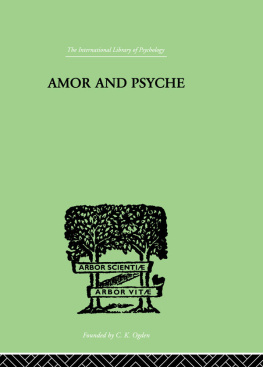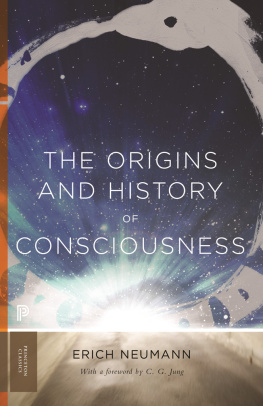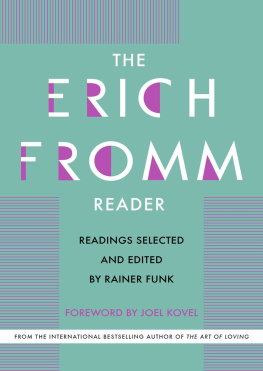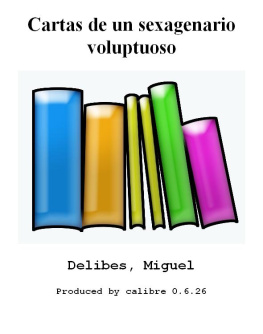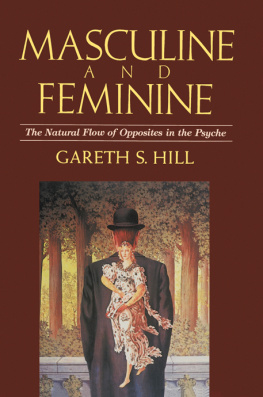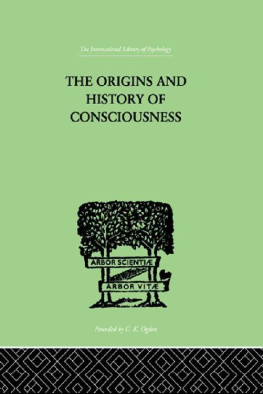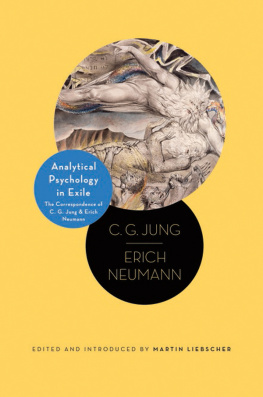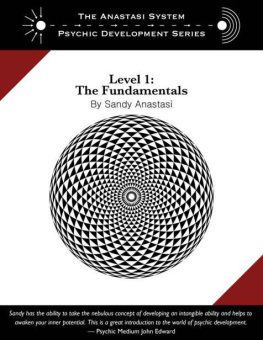Erich Neumann - Amor and Psyche: The Psychic Development of the Feminine
Here you can read online Erich Neumann - Amor and Psyche: The Psychic Development of the Feminine full text of the book (entire story) in english for free. Download pdf and epub, get meaning, cover and reviews about this ebook. year: 0, genre: Science. Description of the work, (preface) as well as reviews are available. Best literature library LitArk.com created for fans of good reading and offers a wide selection of genres:
Romance novel
Science fiction
Adventure
Detective
Science
History
Home and family
Prose
Art
Politics
Computer
Non-fiction
Religion
Business
Children
Humor
Choose a favorite category and find really read worthwhile books. Enjoy immersion in the world of imagination, feel the emotions of the characters or learn something new for yourself, make an fascinating discovery.
- Book:Amor and Psyche: The Psychic Development of the Feminine
- Author:
- Genre:
- Year:0
- Rating:5 / 5
- Favourites:Add to favourites
- Your mark:
- 100
- 1
- 2
- 3
- 4
- 5
Amor and Psyche: The Psychic Development of the Feminine: summary, description and annotation
We offer to read an annotation, description, summary or preface (depends on what the author of the book "Amor and Psyche: The Psychic Development of the Feminine" wrote himself). If you haven't found the necessary information about the book — write in the comments, we will try to find it.
Amor and Psyche: The Psychic Development of the Feminine — read online for free the complete book (whole text) full work
Below is the text of the book, divided by pages. System saving the place of the last page read, allows you to conveniently read the book "Amor and Psyche: The Psychic Development of the Feminine" online for free, without having to search again every time where you left off. Put a bookmark, and you can go to the page where you finished reading at any time.
Font size:
Interval:
Bookmark:
The International Library of Psychology

AMOR AND PSYCHE


Founded by C. K. Ogden
The International Library of Psychology

ANALYTICAL PSYCHOLOGY
In 12 Volumes
I | Studies in Analytical Psychology | Adler |
II | Complex/Archetype/Symbol in the Psychology of C G Jung | Jacobi |
III | Psychology of C G Jung | Jacohi |
IV | Experiment in Depth | Martin |
V | Amor and Psyche | Neumann |
VI | Art and the Creative Unconscious | Neumann |
VII | The Origins and History of Consciousness | Neumann |
VIII | Jungs Psychology and its Social Meaning | Progoff |
IX | Religion and the Cure of Souls in Jungs Psychology | Schaer |
X | Conscious Orientation | van der Hoop |
XI | Lucifer and Prometheus | Werhlowsky |
XII | The Secret of the Golden Flower | Wilhelm |

AMOR AND PSYCHE
The Psychic Development of the Feminine
A Commentary on the Tale by Apuleius
ERICH NEUMANN

First published in 1956 by
Routledge
Reprinted in 1999, 2002 by
Routledge
2 Park Square, Milton Park, Abingdon, Oxon, OX14 4RN
Simultaneously published in the USA and Canada by Routledge
711 Third Avenue, New York, NY 10017
Transferred to Digital Printing 2007
Routledge is an imprint of the Taylor & Francis Group
First issued in paperback 2013
1956 by Bollingen Foundation/Princeton University Press Reprinted by permission of Princeton University Press
All rights reserved. No part of this book may be reprinted or reproduced or utilized in any form or by any electronic, mechanical, or other means, now known or hereafter invented, including photocopying and recording, or in any information storage or retrieval system, without permission in writing from the publishers.
The publishers have made every effort to contact authors/copyright holders of the works reprinted in the International Library of Psychology.
This has not been possible in every case, however, and we would welcome correspondence from those individuals/companies we have been unable to trace.
These reprints are taken from original copies of each book. In many cases the condition of these originals is not perfect. The publisher has gone to great lengths to ensure the quality of these reprints, but wishes to point out that certain characteristics of the original copies will, of necessity, be apparent in reprints thereof.
British Library Cataloguing in Publication Data
A CIP catalogue record for this book is available from the British Library
Amor and Psyche
ISBN 978-0-415-20942-7 (hbk)
ISBN 978-0-415-86429-9 (pbk)
CONTENTS
The text used for the tale of Amor and Psyche is from H. E. Butlers translation of The Metamorphoses or Golden Ass of Apuleius of Madaura, published at the Clarendon Press, Oxford, 1910, in two volumes, and used with the permission of the Press. Archaic forms of address have been changed to modern forms except in passages where a mortal addresses a god or goddess, or a creature or inanimate thing addresses a mortal. In a few other cases, the language has been modified to remove rather extreme archaisms or to conform with the German translation (by Albrecht Schaeffer) originally used by Dr. Neumann, where this was necessary to bring out Dr. Neumanns meaning. In general, the name of the god is given as Amor throughout the tale rather than Cupid.
Acknowledgment is gratefully made, also, to the Hogarth Press for a quotation from J. B. Irishmans translation of Rainer Maria Rilkes Poems; to Farrar, Straus, and Cudahy for a passage from Robert Graves translation of The Golden Ass (U.S. copyright 1951 by Robert Graves); and to Miss Emily Chisholm for a passage from her unpublished translation of Rilkes Alcestis.

Based on the Translation of H. E. Butler
Amor and Psyche
I N a certain city there once lived a king and queen. They had three daughters very fair to view. But whereas it was thought that the charms of the two eldest, great as they were, could yet be worthily celebrated by mortal praise, the youngest daughter was so strangely and wonderfully fair that human speech was all too poor to describe her beauty, or even to tell of its praise. Many of the citizens and multitudes of strangers were drawn to the town in eager crowds by the fame of so marvelous a sight and were struck dumb at the sight of such unapproachable loveliness, so that, raising their right hands to their lips, with thumb erect and the first finger laid to its base, they worshiped her with prayers of adoration as though she were the goddess Venus herself. And now the fame had gone abroad, through all the neighboring towns and all the country round about, that the goddess, who sprang from the blue deep of the sea and was born from the spray of the foaming waves, had deigned to manifest her godhead to all the world and was dwelling among earthly folk; or, if that was not so, it was certain, they said, that heaven had rained fresh procreative dew, and earth, not sea, had brought forth as a flower a second Venus in all the glory of her maidenhood.
This new belief increased each day, until it knew no bounds. The fame thereof had already spread abroad to the nearest islands and had traversed many a province and a great portion of the earth. And now many a mortal journeyed from far and sailed over the great deeps of ocean, flocking to see the wonder and glory of the age. Now no man sailed to Paphos or Cnidos, or even to Cythera, that they might behold the goddess Venus; her rites were put aside, her temples fell to ruin, her sacred couches were disregarded, her ceremonies neglected, her images uncrowned, her altars desolate and foul with fireless ashes. It was to a girl men prayed, and it was in the worship of mortal beauty that they sought to appease the power of the great goddess. When the maid went forth at morning, men propitiated the name of Venus with feast and sacrifice, though Venus was not there; and as the maid moved through the streets, multitudes prayed to her and offered flowers woven in garlands or scattered loose at will.
But the true Venus was exceedingly angry that divine honors should be transferred thus extravagantly to the worship of a mortal maid. She could bear her fury no longer, her head shook, a deep groan burst from her lips, and thus she spoke with herself: Behold, I the first parent of created things, the primal source of all the elements; behold, I Venus, the kindly mother of all the world, must share my majesty and honor with a mortal maid, and my name that dwells in the heavens is dragged through the earthly muck. Shall I endure the doubt cast by this vicarious adoration, this worship of my godhead that is shared with her? Shall a girl that is doomed to die parade in my likeness? It was in vain the shepherd, on whose impartial justice Jove set the seal of his approval, preferred me over such mighty goddesses for my surpassing beauty. But this girl, whoever she be, that has usurped my honors shall have no joy thereof. I will make her repent of her beauty, even her unlawful loveliness.
Next pageFont size:
Interval:
Bookmark:
Similar books «Amor and Psyche: The Psychic Development of the Feminine»
Look at similar books to Amor and Psyche: The Psychic Development of the Feminine. We have selected literature similar in name and meaning in the hope of providing readers with more options to find new, interesting, not yet read works.
Discussion, reviews of the book Amor and Psyche: The Psychic Development of the Feminine and just readers' own opinions. Leave your comments, write what you think about the work, its meaning or the main characters. Specify what exactly you liked and what you didn't like, and why you think so.

